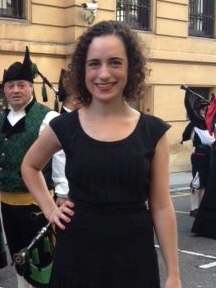By Megan Lehman
Sophie Amado stands outside the train station near her home in Spain, feeling the breeze as the train as it streams by her. As she and her fellow commuters make their way into the city, spilling out of the train as it comes to a halt, Sophie makes her way to her job as an English teaching assistant in Madrid.
Amado, a Chicago native who graduated from Trinity High School in 2010, is a Phi Beta Kappa member and recent graduate from the University of Iowa. As an undergraduate, she was an English major in the creative writing track. After adding a Spanish major to her list of accolades in her junior year, Amado applied in October of 2014 to be an English teaching assistant through a Fulbright Scholarship and was accepted.
“I applied because I’d met another Fulbright teaching assistant alum in one of my English classes,” Amado said. “She raved about her experience, which inspired me to look up information about the program.”
“Teaching is a field I may want to pursue after grad school; I’m not sure yet, but I’ve always learned by doing,” she explained. “I figured this experience would give me some insight into the teaching realm.”
As an English teaching assistant, Amado spends 16 hours a week in a bilingual high school with groups of Spanish students, all at various levels of English speaking ability. In addition to this responsibility, she is in charge of teaching a curriculum called Global Classrooms, a model United Nations program. Through this program, the students have learned how to draft a position paper about countries they were assigned, the proper way to speak in public, the basics of debate, the ins and outs of avoiding plagiarism, and much more.
Being a Fulbright Scholar has allowed Amado the opportunity to change lives, including her own. Traveling through Spain and Europe when not in the classroom, she has been fortunate enough to add things like meeting the King of Spain at the Prince of Asturias Award Ceremony to her list of memories made.
When asked about the value of the program to her, and to her future work, Amado replied:
“This experience is incredible valuable. First of all, I’m living in another culture, which I think is one of the most enriching ways to grow in this life. You have to learn how to adapt to things that are foreign to you and learn how to be flexible. I also spend time writing each week about my experiences here and my writing samples may be useful to me as I start graduate school in the fall. Finally, I’ve been able to meet so many different kinds of people, Europeans and other Americans, and I would not have had that kind of exposure without this year of living abroad.”
The Fulbright Scholarship has been impacting lives since it was signed into action on August 1, 1946 by President Harry Truman and Congress. This program has been creating bonds of bilateral relationships through which citizens and governments from countries all over the world work with the United States to set goals and boundaries for the shared needs of the participants. With hundreds of applicants each year, every student accepted into this program takes away a lifetime of memories and an abundance of opportunities.
The Fulbright Scholarships program is the largest exchange program in the U.S., offering students and young professionals opportunities to take their graduate research and world by storm. With nearly 1,900 grants awarded to applicants annually from all fields of study, program participants may travel to more than 140 countries worldwide as a Fulbright Scholar. Alumni of the program include ambassadors, members of Congress, journalists, university presidents, and many more who left behind some big shoes to fill with even bigger achievements.
Once she returns from Spain, Amado will attend Colombia College Chicago in the pursuit of an MFA in creative nonfiction writing. But for now, she is waiting for her train outside Madrid and waiting for her next chance to change the world.
Megan Lehman is a senior at the University of Iowa majoring in communications, minoring in Spanish. The University of Iowa is home to the Alpha of Iowa Chapter of Phi Beta Kappa.




